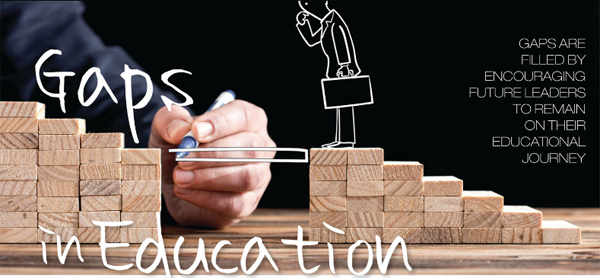Gaps in education
by Jason Bader
Over my career, I have formed relationships with other second- and third-generation professionals in the distribution industry. I spent over half of my professional life as the second-generation heir apparent in my family business. Although I did not remain with that company, I received quite an education in what it feels like to be that next one up to bat. Additionally, I found that there were several gaps in my education that would have better prepared me for this responsibility. The more you can fill in these gaps, and follow a few best practices, the better chance you have for a successful transition.
As many other family business people have experienced, I went to work in the warehouse at an early age. I often joke with audiences that my father broke a few child labor laws to get me involved. I drove a forklift long before I could legally drive a car. For many summers, I worked in that warehouse and eventually on the front counter. Again, this is nothing new for kids in a family business. Most of my peers had similar experiences. Before entering the company full time, after college, I did one of the best things I could for my development – I left.
Both my brother and I left the company for a period of time after college. I went overseas for a year and my brother spent a couple of years working in a mountain town. Upon reflection, this departure helped shape my respect for the family business and allowed me to be a much better contributor when I returned. My more successful peers have echoed the same thoughts. Some left for 18 months, while a couple friends spent more than five years in other industries. Most family business consultants believe that some separation from the company is a healthy way to prepare for a transition.
During my time away, I found out how to make it on my own. I had to hustle and perform without the safety net of the family checkbook. I learned to work for someone not related to me and ultimately learned how to be a good employee. It also gave me the confidence that I could survive, and even thrive, on my own. Not a bad skill set for a future leader. Several of my peers who spent time in other industries brought back very specific skill sets to help the company evolve. This time away, provided that it is well spent, can help more senior employees view the next generation in a different light. No longer are you the silver spoon heir to the throne, you actually have something to bring to the table.
Upon returning to the fold, the education must continue. Too often, I see owners struggle to provide the necessary tools for success. They let their child move along the same job progression as others in the company, but fail to take them aside for additional ownership training. One of the most common educational gaps is in the financial arena. I was recently on the phone with one of the next generationers I coach and he shared with me that he and his father have been going over the monthly profit and loss statement for the company. This is fantastic. By understanding the basic financials, he will recognize patterns and ratios for various income and expense lines. These ratios will serve him well.
Financial education, particularly cash flow, is not always the easiest to teach. Some people were exposed to this in school, but it can be difficult to translate the theoretical into the nuances of the family business. I would recommend that the second generation spend some time with a well-meaning CFO or controller. Furthermore, it would be advantageous to learn how banking relationships and lines of credit work. If the next-generation leader eventually takes the reins, they are going to be borrowing money. Finally, I would suggest that you seek out a “finance for non-financial managers” course. A quick Google search will yield several different options to choose from.
While financial education can be fairly concrete, learning the nuances of managing people is certainly a bit more fluid. I recently spent a lot of time and research on the subjects of leadership and management. An old mentor of mine, Dr. Rick Johnson, was heavily involved with the congruence and divide of these two activities. One of the more profound things he taught me was that leaders do not necessarily have to be great managers, but managers have to be solid leaders. Leadership has many definitions and opinions, but one commonality seems to be the building of relationships. While I don’t want to go too far into the differences between the two arenas, the common thread is relationship building.
As I reflect on the success of my family business, I have come to realize that my father was an investor in people. Although competent in the individual components of the business, such as sales and operations, his true gift was in building a solid team of managers in each of these aspects. Teaching next-generation leaders how to encourage, inspire and relate to people is one of the best things an owner can do.
When developing the future leader, I would always encourage the owner to focus on communication skills and, more specifically, generational differences. When I teach managers about communication, we tend to spend a lot of time in this area. Frankly, generational differences can make it difficult to communicate expectations and create relationships in the company. By the way, no particular generation gets a pass here. Each generation is guilty of dismissing the core values of others outside of their own generation. The study of how to overcome generational challenges in the workplace was one of the most profound pieces of education I was exposed to. This did not come naturally. I had to seek out this information and apply the principals. As a second-generation manager flailing in my role, I was literally saved by a researcher named Claire Raines. Her work can be found online at generationsatwork.com.
There are several other educational areas a next-generation owner should become involved with. One of the most valuable concepts you can help them understand is humility. While humility is often confused with being “less than” or some other negative characteristic, this could not be further from the truth. My favorite definition of humility is the ability to remain teachable. These gaps in education are not going to be filled in days, months or years. The gaps are filled by encouraging future leaders to remain on their educational journey. If I can be of service in this endeavor, know that I am always here to help.
 Jason Bader is the owner of The Distribution Team, which specializes in helping distributors become more profitable through strategic planning and operating efficiencies. For more information, call (503) 282-2333 or contact him by email at Jason@Distributionteam.com or visit www.thedistributionteam.com.
Jason Bader is the owner of The Distribution Team, which specializes in helping distributors become more profitable through strategic planning and operating efficiencies. For more information, call (503) 282-2333 or contact him by email at Jason@Distributionteam.com or visit www.thedistributionteam.com.
This article originally appeared in the July/August 2018 issue of Industrial Supply magazine. Copyright 2018, Direct Business Media.














